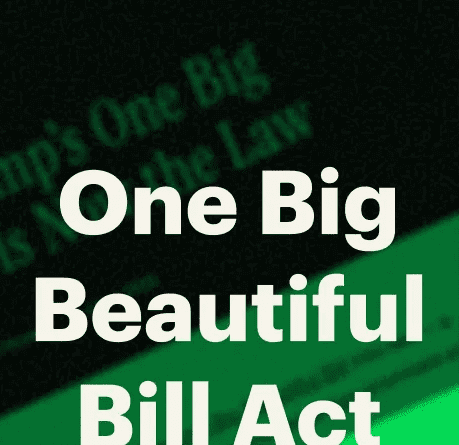How does the One Big Beautiful Bill impact small business taxes?
One Big Beautiful Bill Act small business provisions – Key takeaways
- The One Big Beautiful Bill Act (OBBBA), part of President Trump’s 2025 tax plan, was passed by Congress on July 3, 2025.
- The One Big Beautiful Bill small business provisions make QBI tax deductions permanent, simplify reporting thresholds, and create new employee deductions for overtime and tips.
- Small business owners can turn to Block Advisors for expert help navigating the One Big Beautiful Bill’s tax changes.
The Trump tax plan of 2025 – A new era of business tax reform

On July 3, 2025, Congress passed the One Big Beautiful Bill Act (OBBBA)— President Trump’s tax plan for 2025. Part of this legislation reshapes how small businesses manage their taxes. Whether you’re a sole proprietor, LLC, or S Corp, the One Big Beautiful Bill Act has small business provisions which may affect your bottom line.
Every situation is different, but generally, the One Big Beautiful Bill small business provisions mentioned below are designed to help Main Street entrepreneurs. Currently, the One Big Beautiful Bill act provides several ways for small business owners to possibly reduce their tax burden and simplify their taxes. If you’re wondering, “What’s in the Big Beautiful Bill that could impact my business?” you’re not alone!
Keep reading to learn what One Big Beautiful Bill Small Business provisions could mean for you, what your business can do to prepare, and how Block Advisors can help you navigate these and future tax law changes with confidence.

Who else is affected by the new One Big Beautiful Bill changes? Learn more about other OBBB implications >>
Key small business tax changes in the One Big Beautiful Bill Act
The Qualified Business Income Deduction (QBI) is now permanent
The QBI deduction (Qualified Business Income Deduction)—originally part of the 2017 Tax Cuts and Jobs Act—has been made permanent as part of the Trump tax plan in 2025. This allows eligible pass-through entities to deduct up to 20% of their qualified income. This includes entities like sole proprietors, partnerships, and S-corps. The income thresholds that guide the Qualified Business Income Deduction will track with inflation, increasing from year to year. There are still phaseout levels for service-based businesses. There is also a minimum deduction of $400 for businesses with at least $1,000 of qualified business income. The changes to the Qualified Business Income deduction are effective for tax year 2026.
100% immediate expensing is back
Businesses may once again fully expense certain capital investments in the year they are made due to changes announced in the One Big Beautiful Bill. For example, instead of depreciating the cost of major purchases over several years, a business owner may now choose to account for the cost entirely in the year it is placed into service. This applies to investments such as machinery, equipment, and technology upgrades. So, if you’re looking to modernize or invest in these things, you now have this option. Your tax pro can help you understand what depreciation timeline makes the most sense for your business goals.
Get guidance from a Small Business Certified Tax Pro
Learn how new tax rules may impact your company
Make an appointment >>
Higher 1099 reporting thresholds
Starting in 2026, as part of the Trump tax plan of 2025, businesses only need to issue a 1099-NEC or 1099-MISC if they pay an independent contractor, freelancer, or other non-employee $2,000 or more. Previous to the One Big Beautiful Bill Act, the 1099-NEC and 1099-MISC reporting threshold sat at $600. Furthermore, the changes to the 1099-K reporting threshold have been reversed entirely. Reporting thresholds for third-party payment platforms such as Venmo and PayPal will revert to the previous $20,000 level and require at least 200 transactions. If you deal with 1099-Ks, 1099-NECs, or 1099-MISCs these changes will likely reduce how much paperwork you send out or receive at tax time. However, it is important to note that taxpayers, including self-employed people, must always report all the income they receive.
New deductions for overtime and tips
One of the most talked-about One Big Beautiful Bill small business provisions relates to employee compensation. Employees may be able to deduct some or all the tips and overtime pay they receive beginning tax year 2025, with income caps to prevent high earners from benefiting disproportionately. Employee deductions include up to $25,000 per individual employee for tips and up to $12,500 ($25,000 for joint filers) for overtime. Phaseouts begin for employees whose MAGI (Modified Adjusted Gross Income) is more than $150,000 ($300,000 for joint filers). If you have employees, this change as part of the Trump tax plan in 2025 may impact payroll reporting processes – so be aware. The U.S. Treasury has released a list of the proposed occupations that may qualify for the overtime and tips deduction.
How the One Big Beautiful Bill Act affects tax liability
The best way to determine how the new One Big Beautiful Bill may impact your tax liability is to meet with a tax pro to review your unique situation. It’s important to note that some of the OBBB small business provisions listed above can apply retroactively to the 2025 tax year. This includes the exemptions for employee tips and overtime. To account for this, you may want to review your estimated tax payments. But you don’t need to go-it-alone – Block Advisors has your back. If you need help adjusting your tax strategy and documentation, reach out today.
Need help understanding OBBB implications?
A Block Advisors Small Business Certified tax pro can help.
Make an appointment >>
Common questions about the OBBB & small businesses
Does the One Big Beautiful Bill replace previous tax laws?
The One Big Beautiful Bill Act builds on the 2017 Tax Cuts and Jobs Act (TCJA), making some provisions permanent and adding new ones.
When do One Big Beautiful Bill Act changes take effect?
The changes outlined in the One Big Beautiful Bill are effective immediately, with some aspects being retroactively effective as early as January 1, 2026.
What if I don’t comply with the One Big Beautiful Bill updates?
As always, failing to accurately track and report your company’s income, expenses, and other financial details could put you at risk of more than simply missing out on a deduction. Working with a bookkeeper and tax professional with specific small business expertise can help you minimize potential penalties that come with being out of compliance.
Get help understanding the One Big Beautiful Bill small business provisions
The One Big Beautiful Bill Act is more than just a tax update—it will impact how small businesses operate and grow over the next year and beyond. With the right guidance, you can turn these changes into opportunities for your small business.
Block Advisors’ Small Business Certified Tax Pros understand the nuances of the One Big Beautiful Bill Small Business provisions. They work with small business owners like you to develop and execute strategies to help clients grow their businesses. From bookkeeping to payroll services to tax filing and business formation, Block Advisors experts work with their small business clients year-round. Make an appointment today to talk with an expert about how new small business tax laws may impact your business.
Not quite ready to sit down one-on-one with a pro just yet? More tools and resources are available online to help you on your small business journey – explore our resource center to stay informed and empowered.
This article is for informational purposes only. The content may not constitute the most up-to-date information and should not be construed as legal advice.






